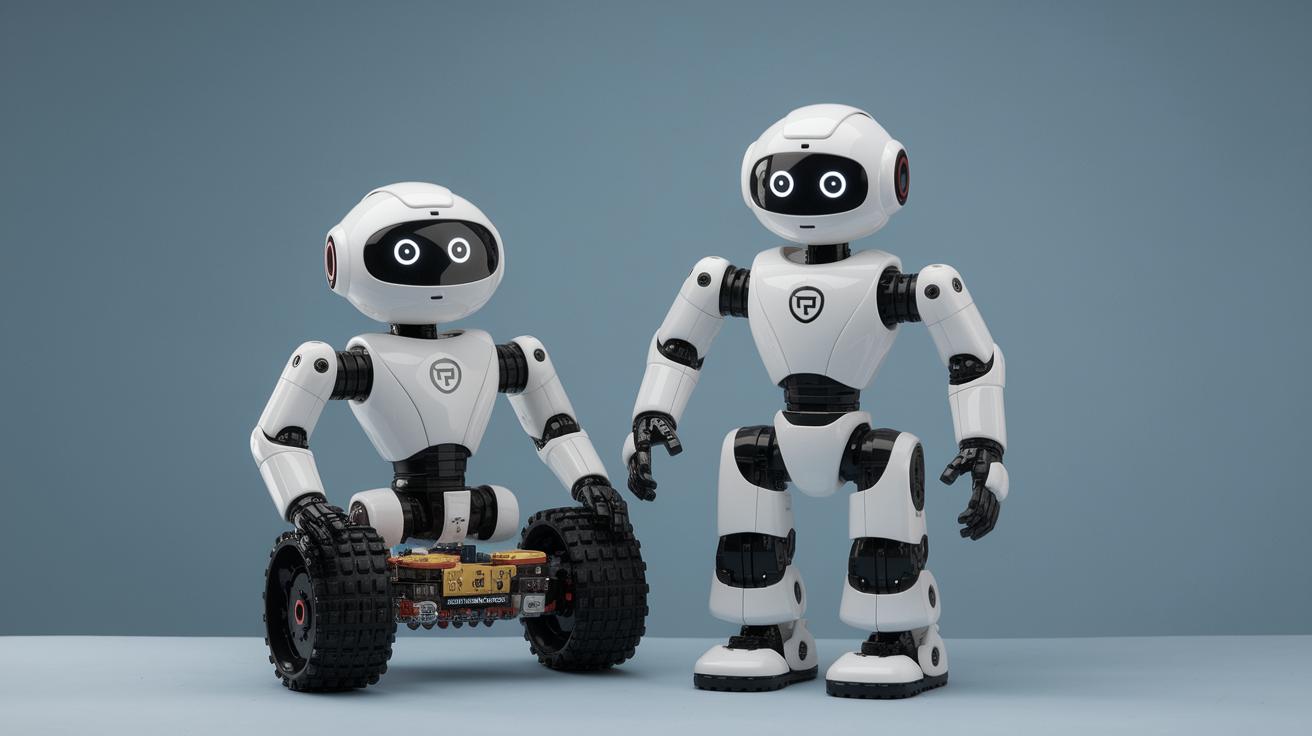How to Get Started with Learning About Robotics
Robotics, a fascinating intersection of engineering, design, and technology, is shaping the future by revolutionizing industries and enhancing everyday life. Whether you’re a curious beginner, an enthusiastic hobbyist, or an aspiring professional, venturing into the world of robotics can be incredibly rewarding. This guide is designed to help you navigate the first steps towards learning about robotics by exploring hands-on projects, identifying valuable resources, and connecting with a vibrant global community. From utilizing beginner-friendly kits to discovering inspiring YouTube creators and engaging in competitive events, this article covers everything you need to begin your journey. Read on to discover how to build your first robot, boost your skills with formal education, and delve deeper into the world of robotics.
How to start building robots
Embarking on the path to building robots begins with understanding the fundamentals. Start by familiarizing yourself with basic electronics, which is the backbone of any robotic system. You can explore resources like online tutorials, books, and interactive courses that cover the essentials of circuits and electronics. Engaging in practical projects is crucial; consider starting with simple circuits and gradually progressing to more complex components like sensors and microcontrollers.
Once you have a solid grasp on electronics, it’s time to integrate your knowledge into real-world applications by working on small-scale robotic projects. Building a simple robot, like a line follower or a light-seeking bot, can be an excellent starting point. These projects teach you about various aspects of robotics, such as actuation, control, and feedback systems, and are often supported by ample online resources and communities.
Making things and finding inspiration
1. Beginner level: Robot coding
Learning to code is a fundamental skill for anyone interested in robotics. Start with beginner-friendly programming languages like Python, which is widely used due to its simplicity and effectiveness. Many online platforms offer free or affordable courses aimed at beginners that will teach you the basics of coding in a structured way. Platforms like Codecademy, Coursera, and Khan Academy are excellent places to start.
As you become comfortable with basic programming, it’s beneficial to transition to coding environments specific to robotics, such as Arduino and Raspberry Pi. These platforms provide a hands-on approach to learning, where you can apply coding skills directly to control hardware components. They also have vibrant communities and forums where you can find guidance and share projects.
2. Intermediate level: Robot kits
Once you’ve built a foundation in coding and electronics, consider exploring robot kits designed for intermediates. Kits such as LEGO Mindstorms, VEX Robotics, or Makeblock’s mBot offer an excellent bridge to more complex robotic concepts. They provide comprehensive guides and tutorials, allowing you to understand and assemble components into a functional robot, which boosts your confidence and hands-on experience.
These kits not only teach assembly but also introduce essential concepts like sensor integration, basic programming logic, and wireless communication. Working with kits helps develop problem-solving skills and offers a springboard to more personalized projects by modifying or expanding the initial designs.
3. Advanced level: Robot platforms
For those ready to delve deeper, advanced robot platforms such as the Robot Operating System (ROS), open up a world of possibilities. ROS is a flexible framework used in both academia and industry for developing robust robotic applications. Engaging with ROS helps you understand how multi-component robotic systems interact in a real-world environment.
Advanced platforms require a higher level of coding sophistication and a better understanding of algorithms, making them ideal for those with a firm grasp on intermediate skills. There are various simulation tools available like Gazebo, which allows you to test robotic systems in a virtual environment before deploying them in the physical world.
YouTubers who make things
YouTube is a treasure trove of creators who demystify robotics with engaging content. Channels like “Michael Reeves,” where humor meets innovation, or “Simone Giertz,” the Queen of Shitty Robots, provide a fun perspective on building robots, encouraging viewers to embrace both creativity and technical skills without the fear of failure.
For more detailed tutorials and analysis, channels like “GreatScott!” and “ElectroBOOM” dive into electronics and robotics projects with a focus on teaching. These creators often mix humor with education, offering projects that range from basic to complex, with guided walkthroughs that demystify challenges and inspire confident experimentation.
How to find robotics events and competitions
FIRST Robotics Competition
The FIRST Robotics Competition (FRC) is a high-energy, worldwide competition that provides students with real-world engineering experience. Teams of students work together to build robots that can complete specific tasks, fostering not only technical skills in mechanics and programming but also teamwork and strategic problem-solving abilities.
Participating in FRC connects you with a global network of mentors, industry professionals, and peers, providing invaluable social and learning opportunities. It is an excellent way to apply academic knowledge in a practical setting, honing skills imperative in the tech industry.
VEX Robotics Competition
The VEX Robotics Competition offers another competitive platform for students to explore robotics. With challenges that focus on the fundamentals of robotics, VEX caters to various age groups, from elementary school to university levels. This scalability ensures students at any level can find an appropriate challenge that stimulates growth and learning.
In addition to fostering a passion for STEM (Science, Technology, Engineering, and Mathematics), VEX Competitions encourage creativity and innovation. Through hands-on experience, participants learn essential skills such as design, programming, and teamwork, preparing them for future careers in robotics and engineering.
RoboCup
RoboCup is an international robotics competition with the ambitious goal of advancing the field to where a team of fully autonomous humanoid robots can win a soccer match against the human world cup champions by 2050. This event provides a platform for researchers and students to showcase their work and foster collaboration across disciplines.
Participating in RoboCup requires a blend of AI, image processing, and control automation skills, making it an attractive option for those with a keen interest in the cutting-edge evolution of robotics. It represents a convergence of academic research and practical application, pushing the limits of current technological capabilities.
Other robot events
Apart from the mainstream competitions, several niche events cater to specific aspects of robotics. Events like BattleBots, where participants create combat robots, or the Drone Racing League, focusing on aerial robotics, provide alternative avenues to explore interests outside conventional formats.
These events often carry a strong community spirit, where innovation is celebrated, and creativity is encouraged. They not only provide a competitive edge but also spur participants to continuously improve their designs through peer feedback and iterative development.
Events for robotics professionals
For those looking to take their skills to a professional level, attending conferences and expos like the IEEE International Conference on Robotics and Automation or the Robotics Summit & Expo can be highly beneficial. These events bring together leading minds in the field, providing insights into the latest advancements and future trends.
Networking opportunities at such events can lead to collaborations, mentorship, and career advancement, as attendees have direct access to cutting-edge research and potential employers. Staying informed and connected within the industry is crucial for anyone aiming to have a long-term career in robotics.
Why you should join FIRST
Joining FIRST is more than just participation in a robotics competition; it’s an entry into a supportive community that fosters growth, innovation, and leadership. FIRST is dedicated to inspiring young people to become science and technology leaders through engaging programs that challenge the status quo.
Through involvement in FIRST programs, students gain valuable life skills such as public speaking, fundraising, and project management. They also expand their horizons by interacting with sponsors and industry professionals, which can lead to internships and career opportunities. The experience is transformative and often serves as a launchpad for careers in tech, engineering, and beyond.
How to get a degree in robotics
Pursuing a degree in robotics is a comprehensive way to delve deeper into the field. Many universities now offer specialized programs in robotics or mechatronics engineering. These programs typically cover a broad array of topics, including machine learning, control systems, and computer vision.
The curriculum often involves a mix of theory and practical application, with opportunities for research projects, internships, and lab work that equip students with hands-on skills critical in the workforce. Graduates from these programs are well-prepared to enter industries such as manufacturing, aerospace, healthcare, and autonomous vehicle development.
What to study to become a roboticist
Aspirants aiming to become roboticists should focus their studies on a mix of disciplines, as robotics is inherently interdisciplinary. Core areas include computer science, electrical engineering, and mechanical engineering, as they form the foundational pillars of robotics.
Beyond these, gaining knowledge in areas such as artificial intelligence, machine learning, and human-computer interaction can significantly enhance one’s skills. This multidisciplinary approach not only broadens your understanding but also opens up numerous avenues in the robotics landscape.
How to join the global robotics community
Joining the global robotics community is crucial for anyone serious about this field. Engaging with online forums, such as the Robotics Stack Exchange or Reddit’s r/robotics, helps you stay updated with the latest discussions and developments. These platforms are valuable for exchanging knowledge and finding solutions to complex problems.
Additionally, participating in hackathons and maker fairs can connect you with like-minded individuals and industry experts. Being part of a community allows for collaboration, idea exchange, and continuous learning, which are all vital for success in the ever-evolving tech landscape.
More Articles & Resources
Robotics Questions article
For those who find themselves with more specific queries along their learning journey, the Robotics Questions article is an excellent resource. It curates frequently asked questions and provides detailed answers, helping to clarify common misconceptions and guide learners through complex concepts.
The article serves as a valuable reference point, especially for beginners who may feel overwhelmed by the breadth of the field. It breaks down intricate topics into comprehensible sections, making it easier to digest information and apply it practically.
Robot Activity Sheets resource
Educational resources like Robot Activity Sheets are designed to make learning both interactive and enjoyable. These sheets offer a range of activities and projects tailored for different skill levels, ensuring that there is something for everyone who is curious about robotics.
Activity Sheets often come with comprehensive guides that include step-by-step instructions, making them perfect for self-paced learning. They encourage creativity and experimentation, which are essential components of understanding and mastering robotic principles.
Future Prospects
| Section | Summary |
|---|---|
| How to start building robots | Begin with basic electronics and simple projects to learn fundamentals. |
| Making things and finding inspiration | Start with coding, move to kits, and then advanced platforms. |
| YouTubers who make things | Discover creators who provide entertaining and educational robotics content. |
| How to find robotics events and competitions | Explore competitions like FIRST, VEX, and RoboCup to apply skills. |
| Why you should join FIRST | Gain real-world skills and join a community of innovators. |
| How to get a degree in robotics | Pursue specialized programs that blend theory with practical application. |
| What to study to become a roboticist | Focus on interdisciplinary subjects including AI and engineering. |
| How to join the global robotics community | Engage with online forums, hackathons, and maker fairs for collaboration. |
| More Articles & Resources | Explore curated questions and activity sheets for further learning. |


